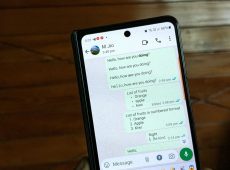Though WhatsApp provides voice note transcription as part of the package, it’s not always the best option. WhatsApp transcription only turns voice into text as you play the voice note – the note will still play even as WhatsApp transcribes. That makes it less than ideal for use cases where you need to read without noise, which is where these AI tools to transcribe WhatsApp audio come into play.
Tool 1 – Transcribe WhatsApp Audio Using WhisperBot

WhisperBot is based on the OpenAI Application Programming Interface (API) and was made specifically for WhatsApp. Transcribe audio in seconds using a tool that offers transcription in over 57 languages—ideal for those who don’t want to be restricted to English alone.
Whisper works by giving you a special “WhisperBot number,” to which you send a WhatsApp voice note. WhisperBot then downloads the note and uses OpenAI’s API to convert the audio into text. That transcript is sent back to your WhatsApp account, with WhisperBot deleting both the audio and text it generated on its end. It claims a 95% accuracy rate—along with immense security—and the only person who has access to the transcript is the one who sent the audio from their WhatsApp account.
Tool 2 – Transcribe WhatsApp Audio with Unvoice

Unvoice works similarly to WhisperBot – it also sets up a separate number to which you can send your WhatsApp audio. That audio is then transcribed and sent back, with Unvoice getting rid of the transcript. However, the service doesn’t mention whether it also gets rid of the voice note you sent, which may raise security concerns.
It’s fast and convenient—requiring just seconds to deliver a transcript—but there is a catch:
The cost.
You only get the first five minutes of audio you send transcribed for free. After that, you have to subscribe to a paid package, with three tiers available ranging from €1.99 to €9.99 per month, which roughly translates to between $2.22 and $11.12 at current exchange rates.
Tool 3 – Transcribe WhatsApp Audio with TranscribeMe

As a slightly more versatile app, TranscribeMe is available for WhatsApp and Telegram. It doesn’t require you to download a separate app and, like WhisperBot, it integrates with GPT to provide accurate transcriptions.
This app works via a direct integration into WhatsApp, after which you can call up the bot to transcribe any audio file you receive. It also functions as a direct link to ChatGPT, allowing you to speak directly to TranscribeMe via a WhatsApp conversation to receive answers to queries you might ask in ChatGPT. There’s a free version, which offers two days of use per month at a maximum of 40 minutes of transcribing. After that, you’re paying a monthly fee to be able to use it all month, though still with a 200-minute limit.
Tool 4 – Transcribe WhatsApp Audio with AudioBriefly

AudioBriefly is another subscription service that promises WhatsApp audio transcription without the need to download a separate app. Instead, you sign up for the service—via the AudioBriefly website—and provide the phone number linked to your WhatsApp account.
From there, you verify that number using a prompt, after which AudioBriefly is added to your WhatsApp as a separate contact with which you communicate. You forward voice notes and audio to that contact, which handles all of the transcription. Every transcription—along with summaries for longer audio—is stored in your AudioBriefly account, which you can access via the web app.
Disclaimer: Some pages on this site may include an affiliate link. This does not effect our editorial in any way.











